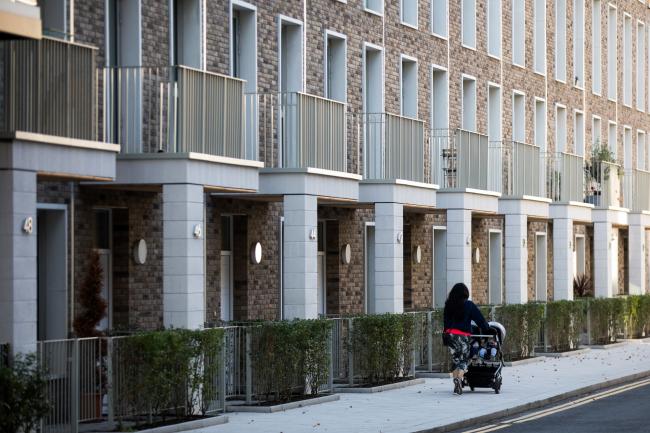(Bloomberg) -- Confused about the state of London property prices? You’re not alone.
There’s plenty of evidence that housing is in a rut, but the downturn that began with the priciest homes four years ago has been slow to spread out from the center of the U.K. capital. The market is now facing a number of additional headwinds, including the prospect of higher taxes and a warning from the Bank of England that U.K. home values could fall as much as 30 percent in the event of a disorderly exit from the European Union.
Here are four overlooked cracks that suggest the London market may be in worse shape than many realize:
Hidden Price Falls
Property flippers are being burned by the slowdown in demand for shiny new apartments. In some cases, homes in towers that are nearing completion are being sold on for as much as 25 percent less than the value at which they were reserved, according to broker MyLondonHome, which has a division specializing in this type of transaction.
“Those vendors that have sold at a loss are hidden from the public eye,” according to MyLondonHome managing director Andrew Griffith. The broker currently sells on about 15 of the contracts a month, he said.
The below-cost sales don’t show up in any official government housing data, which simply registers the original price agreed when the market was in boom mode. This is significant because researcher Acadata changed its forecasting model earlier this year to better capture sales of new-build properties, which typically sell for higher prices than existing homes. That helped turn a decline of 2.5 percent in home prices in the 12 months through April into an increase of 2.9 percent for the same period.
Record-Low Sales
Everyone knows London home sales are falling. One measure, buried deep in a report by the Royal Institution of Chartered Surveyors, suggest they’re now at a record low. Each real estate office is selling an average of just 8 homes every three months even as brokers including Foxtons Group Plc shutter some outlets to cut costs. Looking at the measure over the 12 months through October, sales are at the lowest annualized level since RICS began compiling the data in 1994.
Homebuilder Exodus
Crest Nicholson Holdings Plc closed its London division after warning that the market for new homes there is more difficult than previously anticipated. How bad is it? The number of completed properties that have yet to find a buyer has surged by almost half this year and now stands at a record, according to data compiled by Molior London. In central London, new-home sales are on track to fall by about 25 percent this year, the researcher said.
That’s prompting homebuilders to diversify. Countryside Properties Plc has been shifting its focus away from London and the southeast of England. Berkeley Group Holdings Plc, the London specialist, has also headed into the regions, selling homes at its first project in Birmingham and acquiring two further sites for development.
“The price-to-earnings ratio in Birmingham is less than eight, whereas in London it is just under 15 times,” said Stephen Conway, executive chairman at Galliard Homes, which is developing homes in the U.K.’s second-largest city. “In Birmingham, the lower prices mean you have got no stamp-duty problems.”
Telford Homes Plc, meanwhile, is moving away from home sales to focus on rentals.
More Incentives
The new-homes market faces another knock next year as the government considers an additional stamp-duty tax for overseas buyers of homes in England and Wales. Demand from Asia has already waned following a succession of tax hikes, so developers are offering more incentives to purchasers, including Black Friday discounts of as much as 50,000 pounds ($64,000), to get deals done.
Galliard Homes and Barratt Developments (LON:BDEV) Plc are offering to pay at least some of the stamp-duty bill for buyers of certain properties. Homebuilders are also circumnavigating the globe to find buyers -- Berkeley sent sales reps to Saudi Arabia this year as it widens the net of potential buyers from more historical markets like Hong Kong and Singapore.
A spokesman for Berkeley declined to comment.
(Updates with share price move in seventh paragraph.)
